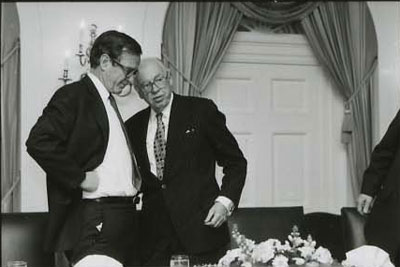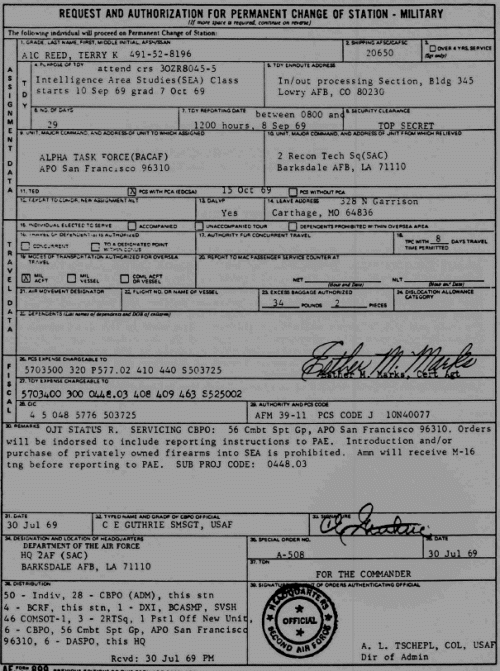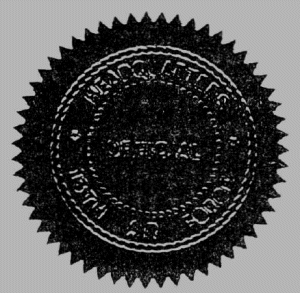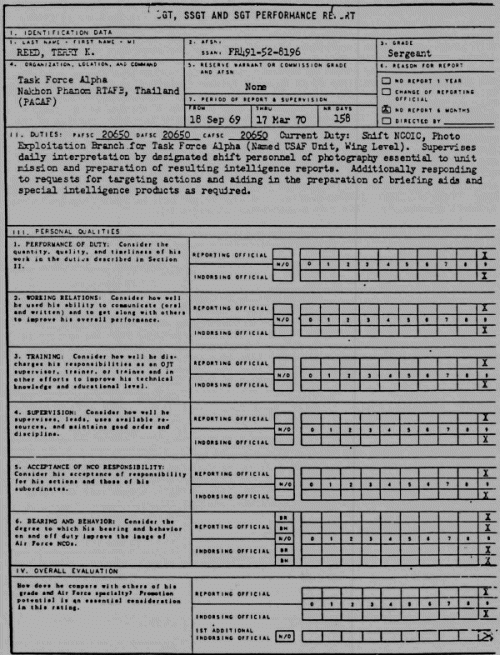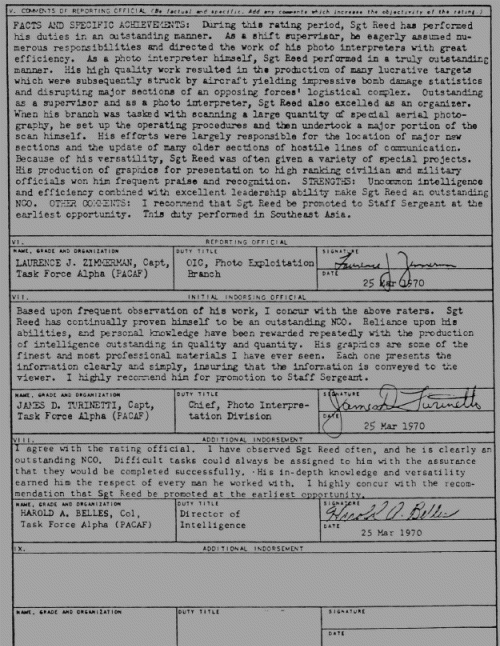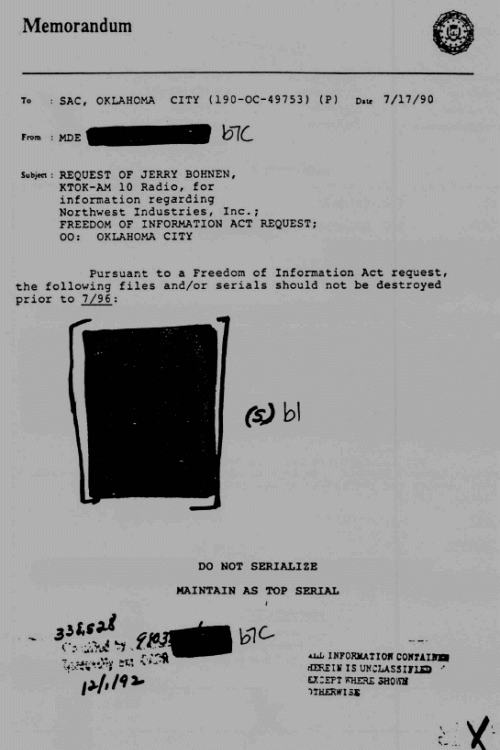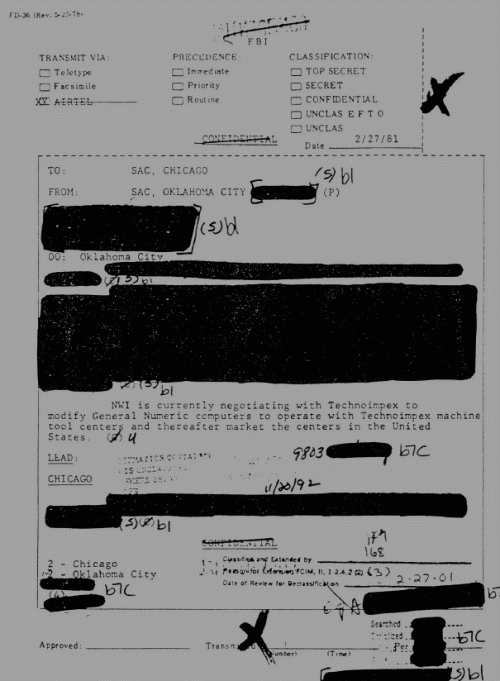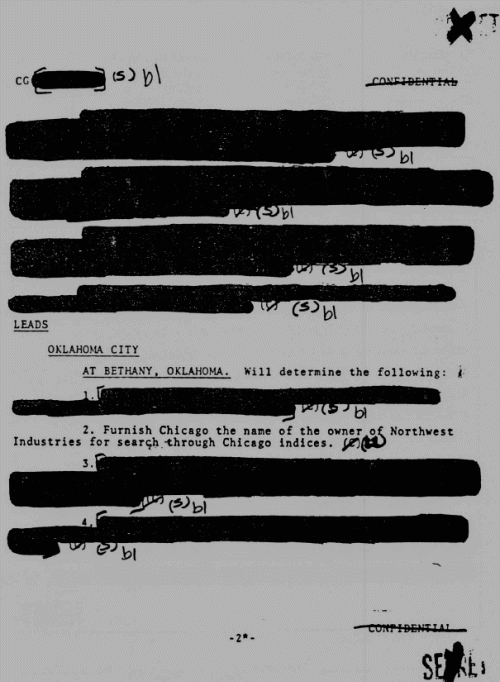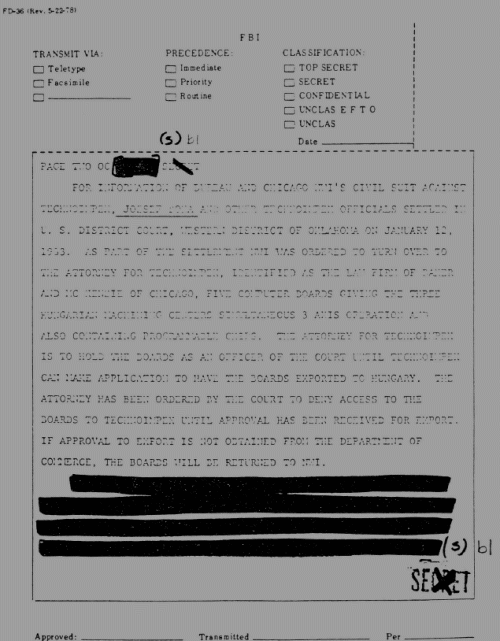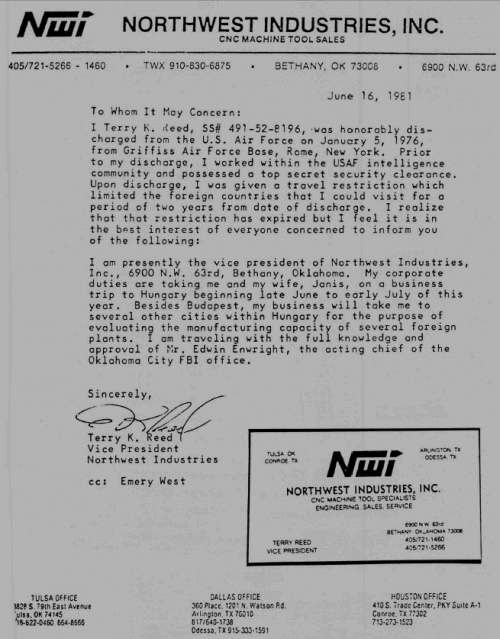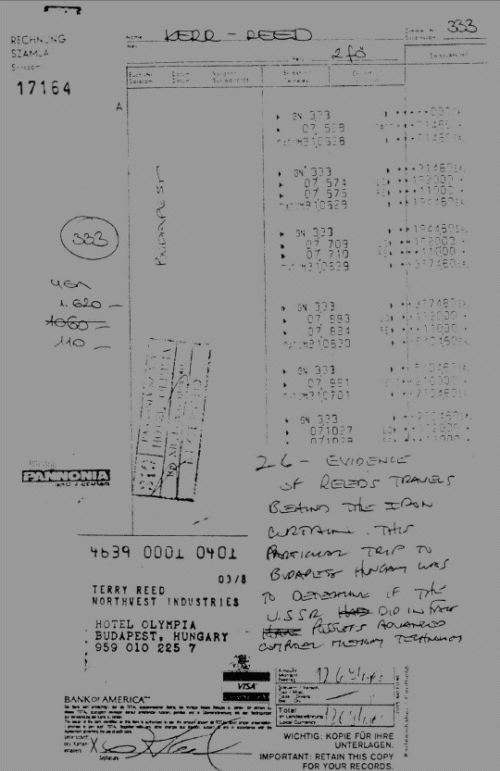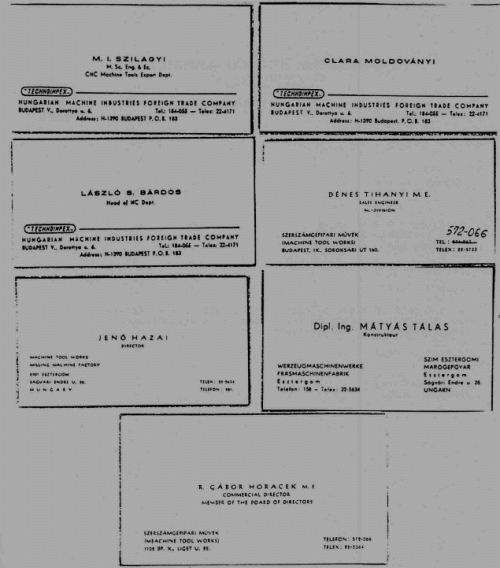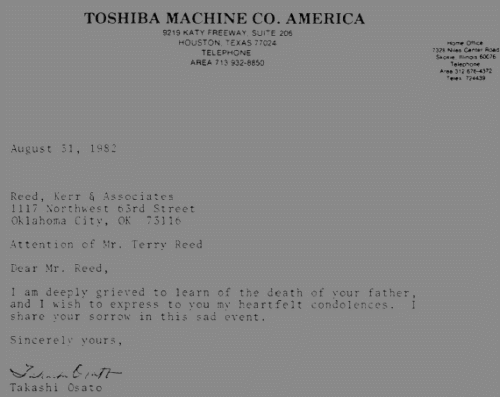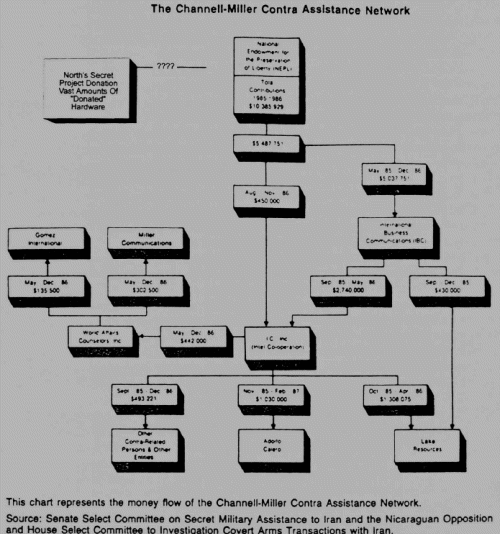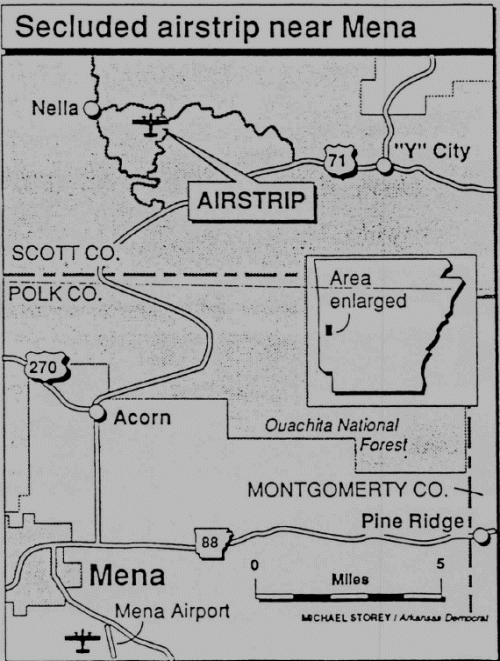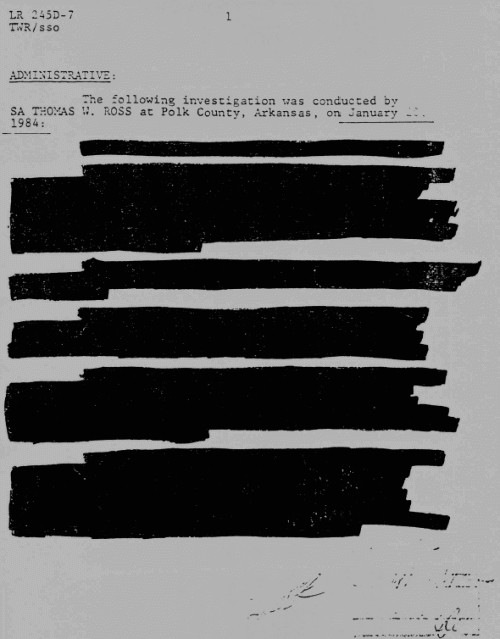by Terry Reed & John Cummings
© 1994 by Terry Reed and John Cummings
NOTICE: THIS WORK MAY BE PROTECTED BY COPYRIGHT
YOU ARE REQUIRED TO READ THE COPYRIGHT NOTICE AT THIS LINK BEFORE YOU READ THE FOLLOWING WORK, THAT IS AVAILABLE SOLELY FOR PRIVATE STUDY, SCHOLARSHIP OR RESEARCH PURSUANT TO 17 U.S.C. SECTION 107 AND 108. IN THE EVENT THAT THE LIBRARY DETERMINES THAT UNLAWFUL COPYING OF THIS WORK HAS OCCURRED, THE LIBRARY HAS THE RIGHT TO BLOCK THE I.P. ADDRESS AT WHICH THE UNLAWFUL COPYING APPEARED TO HAVE OCCURRED. THANK YOU FOR RESPECTING THE RIGHTS OF COPYRIGHT OWNERS.
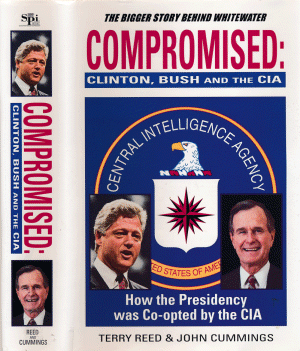
-- Target: Caught in the Crosshairs of Bill and Hillary Clinton, by Kathleen Willey
-- Passion and Betrayal, by Gennifer Flowers with Jacquelyn Dapper
-- Their Lives: The Women Targeted By the Clinton Machine, by Candice E. Jackson
-- Partners in POWER: The Clintons and Their America, by Roger Morris
-- The Secret Life of Bill Clinton: The Unreported Stories, by Ambrose Evans-Pritchard
-- Compromised: Clinton, Bush and the CIA: How the Presidency was Co-opted by the CIA, by Terry Reed & John Cummings
-- Mysterious Deaths and Unmotivated Suicides Have Clinton in Common, by Dave Komer
-- The Secret Life of Bill Clinton: The Unreported Stories, by Ambrose Evans-Pritchard
TABLE OF CONTENTS:
• FRONT & BACK COVERS
• ABOUT THE AUTHORS
• CAST OF CHARACTERS
• AUTHOR'S NOTE
• CHAPTER 1: PATRIOTIC TIME BOMBS
• CHAPTER 2: THE SOONER CONNECTION
• CHAPTER 3: PROJECT DONATION
• CHAPTER 4: INTO THE LOOP
• CHAPTER 5: GETTING OFF THE GROUND
• CHAPTER 6: AMERICA'S BANANA REPUBLIC
• CHAPTER 7: TAIL-NUMBERS GAME
• CHAPTER 8: THE BOMBER
• CHAPTER 9: GOLD MEDAL FLIGHT SCHOOL
• CHAPTER 10: CHRISTMAS PAST
• CHAPTER 11: 'WETA OKAMI'
• CHAPTER 12: STRANGE ALLIANCE
• CHAPTER 13: FEEDING FRENZY
• CHAPTER 14: COMPANY-PAID VACATION
• CHAPTER 15: TRIP ON THE DARK SIDE
• CHAPTER 16: A DATE WITH DEATH
• CHAPTER 17: NEW COVENANT
• CHAPTER 18: WITHDRAWAL SYMPTOMS
• CHAPTER 19: OPERATION SCREW WOR
• CHAPTER 20: MEXICAN HANDOFF
• CHAPTER 21: ESCAPE FROM 'FREEDOM'
• CHAPTER 22: MARGARITAVILLE
• CHAPTER 23: ON ICE
• CHAPTER 24: 'THE SNAKE THAT WOULDN'T DIE'
• CHAPTER 25: PROJECT Z
• CHAPTER 26: BIRTH, LIFE AND DEATH
• CHAPTER 27: POWDERED MONEY
• CHAPTER 28: WHAT A BIRTHDAY PRESENT!
• CHAPTER 29: MAX OR FELIX?
• CHAPTER 30: SEVERANCE PAY
• CHAPTER 31: DOUBLE CROSS
• CHAPTER 32: SERPENTINE
• CHAPTER 33: DEPARTMENT OF INJUSTICE
• CHAPTER 34: P.I.S.S.
• CHAPTER 35: SALVATION AT THE RACE TRACK
• CHAPTER 36: DEEP THROAT IS SABOTAGED
• EPILOGUE
• BIBLIOGRAPHY
• ACKNOWLEDGEMENTS
• INDEX
"Talk to Emile and he'll give you the Seneca right around the first of the year."
"What's significant about the first of the year?"
"The tithing is gonna really go on the increase, come January 1."
"Tithing?"
"Yeah, the dime that the state's workin' on for lettin' the Agency's operation go on here," Seal answered. "You didn't think somethin' this big could be goin' on without havin' to pay for it. Shit, you were in Southeast Asia. Didn't you tell me we had to pay some fuckin' prince in Laos every time the Air Force dropped a bomb there? You see it's all the same, just one fuckin' banana republic after another."
The "dime" Seal referred to was the 10 percent being charged the CIA by high Arkansas state officials for allowing the Agency to operate in Arkansas. The word tithing Terry had learned back in his Sunday school days in the Nazarene Church. The term meant 10 per cent of your money would be given the church and, in return, as the Bible proclaimed, you would get it back 10 fold. And this was undoubtedly true for the CIA.
Arkansas was providing cover for the Agency's illegal airplane modifications, Contra training operations, arms shipments and, from what Seal revealed, ways to invest the black money that was being made from its gun-running to Central America. So that's why the singer Glen Campbell called Arkansas the "land of opportunity."
***
Here he was at the core. Like Dorothy, he had looked behind the curtain and seen the true "Wizard."
Here was what seemed a strange alliance. A state run by Democrats in bed with a Republican administration in Washington, and both conspiring to evade Congress' prohibition against aiding or abetting the Contras. It was so steeped with hypocrisy.
Was the CIA the invisible force that had the power to compromise these political pillars of the nation?
Were these same invisible forces orbiting only in Arkansas or throughout the nation? He wondered. But why limit it to the nation? Perhaps the world functioned under one control. Could that control be the CIA? Was there a secret alliance of agents worldwide who operate as they please?
Religion, he had come to realize, was a form of social control. Was politics as well? Was it just a game like professional sports, simply to divert public attention from what was really happening? Was it all just a placebo?
While driving back to OSI, Terry was strangely quiet and withdrawn. He was feeling manipulated by the social order he had been raised to obey, and now he had doubts about his previous motivations in life.
"You're awfully quiet, Terry-san," Sawahata said after a few minutes.
"Aki I've got to ask you a question. It's funny I've never asked, considering all the time we've spent together. Are you a Republican or a Democrat."
"I am a political atheist. I work for the CIA."
"What does that mean?"
"That means Agency is politics. Agency is the government. Everything else is just puppets, a big game, Terry-san. You did not know that?"
If Terry Reed was not a liability before, he certainly was now. Those who see behind the curtain are always a threat. It was like someone telling the Pope in the 1300s that the world was really round and that it did, indeed, revolve around the sun, rather than the other way around.
***
Seal began yelling at the top of his voice, something totally out of character for him. Terry had never seen him this euphoric.
"YEE-HAWWWWWW," he screamed. "I'm gonna fuckin' make it. We're gonna do this, Terry. We've got these assholes eatin' outa our hands. YEEHAWWWWWWWWW. Give me the fuckin' airplane."
He grabbed the control yoke and executed a series of aileron rolls. Terry had never been sick in an airplane, but he was sure he was about to lose his SOS.
"OK, enough of that shit," Seal said after seeming to tire of the aerobatic antics. "You got the airplane, I'll hook up the radios."
Terry sat silently at the controls, trying to figure out what was driving Seal. As Barry emerged from under the electrical panel, after making the radio connections, he abruptly began pounding with his right hand on the dash of the Lear until Terry thought the avionics in the control panel would be dislodged.
"There ain't nuthin' in this world more powerful than good ol' fuckin' blackmail, Terry. And don't let anybody ever tell ya different. Jeeeeesus Christ, I got some good shit on some big people."
"Will you let me in on your party? Calm down, Barry! Tell me what's goin' on. "
"Terry, what's most important right now is for ya ta play ball with these guys and get your ass down to Mexico ASAP. You impressed the shit out of Leroy ... Robert Johnson, too. I won't be able ta come ta Mexico right now, I've got a little matter ta take care of. But ya get on down there and get in a position to receive me, and I'll be joining ya soon. Goddam, this'll be great. Won't it be fun workin' together and spendin' all their fuckin' money?"
"What this blackmail, you're talking about?"
"Ever hear the old expression, it's not what ya know, it's who ya know? Well, whoever said that just hadn't caught the Vice President's kids in the dope business, 'cause I can tell ya for sure what ya know can definitely be more important than who you know."
"You gotta calm down and tell me what you're talking about, if you want me to know. What's this about the Vice President's kids and dope."
"I don't wannna tell ya too much, 'cause truthfully ya don't have a need to know. But Terry I been workin' with several federal agencies for the past couple of years as ya probably suspicioned. In the course of that business, a person can't help but run across some real sensitive information. It seems some major players in the Medellin Cartel, whom I personally know, ran across some knowledge that's very valuable to both the Republicans and the Democratic Party. Real national security stuff. It seems some of George Bush's kids just can't say no ta drugs, ha ha ha ha ...Well, ya can imagine how valuable information like that would be, can't ya? That could get ya out of almost any kind of jam." Seal paused for a moment then asked, "Ya ever play Monopoly? The information I got is so good it's just like a get-out-of-jail-free card ... ha,ha,ha,ha YEEHAWWWWW..."
"Barry, are you telling me George Bush's kids are in the drug business?"
"Yup, that's what I'm tellin' ya. A guy in Florida who flipped for the DEA has got the goods on the Bush boys. Now I heard this earlier from a reliable source in Colombia, but I just sat on it then, waitin' to use it as a trump card, if I ever needed it. Well, I need ta use it now. I got names, dates, places ....even got some tape recordins'. Fuck, I even got surveillance videos catchin' the Bush boys red-handed. I consider this stuff my insurance policy. It makes me and my mole on the inside that's feedin' the stuff to me invincible. Now this is real sensitive shit inside of U.S. Customs and DEA and those guys are pretty much under control. It's damage control as usual. But where it gets real interestin' is what the Republicans will do ta the Democrats in order ta dirty up the people who might use this information against Bush."
"So you've got direct knowledge of the Republicans trying to neutralize some Democrats before they can nuke Bush with this?"
"Hell yeah. I've been part of it. Remember that meetin' we had at SOBs when I told ya ya should play ball with these guys and get your butt down ta Mexico and be prepared to receive me? ... Remember in that meetin' I told ya I had a plan to blow the lid off the whole damn Mena deal and shut it down due to adverse publicity? Well, what I didn't tell ya was that project was already in effect, and the Republicans were already trying to neutralize some important people in Arkansas ...namely the Clinton family."
Seal took a break to communicate with ground control. When he turned back to Terry, he continued, "Yeah, that day ya explained to me the connection between the Ward family, the Rose Law Firm and the governor's mansion, well ....I about shit! Ya see what ya didn't know was I was on a secret mission by none other than the Agency ta sort of.. ..uh, dirty up some people real close to the governor. Now I had been workin' on this through Dan Lasater. Now Dan's a good ol' boy and all that, but he's gotta drug problem, and he's got the balls to be stealin' from the Agency, too. From what I hear, Dan's been doin' a lot of questionable out-a-state investin'. In fact, he's stashin' a lot of cash in a resort in New Mexico. *
"I was told ta exploit that, which I was workin' on. But you come along with this new connection. And when ya told me that Finis Shellnut was the guy at the ranch (where the 'green flights' dropped their money in Arkansas) ... dollar signs started dancin' in my head. I saw an immediate way to get some white stuff up some noses around Bill Clinton real fast. Now don't get mad, but that duffel bag I had ya take over to Skeeter Ward wasn't really money."
"I'm afraid to ask what it was," Terry said as he focused on the "little airplane" displayed on the Lear's flight director.
"Let's don't call it cocaine. Let's just call it neutralizin' powder. Least that's the way the Bush family saw it. This is just one family warrin' against another. Just like the Mob."
"Goddam, Barry, this is heavy shit! Are you saying you were the source of the cocaine ending up around a lot of important people in Arkansas. Like the ones I've been reading about in the paper. There's a major scandal brewing there ..."
Terry sat silently and continued to think. Seal gazed out the window and said nothing.
Already predicting the answer by Seal's silence, Terry asked, Did you have anything to do with Roger (Clinton) and some of those guys in Lasater's firm getting investigated?
"Terry, I told ya when I met ya, I'm in transportation and I transport what the government wants transported. In this case, the Republicans ... the Bush family ... wanted some stuff transported through Mena and into Arkansas that would end up in the noses of some very prominent Democrats. And yes, I must 'fess up, I've had a hand in that. YEEE-HAWWWWWW! It's not who ya know it's what ya know."
Terry found all this disquieting. Seal had never discussed drugs with him before, and if Barry was telling the truth, he had unknowingly delivered some to Skeeter Ward. Seal was telling him that he had a hand in the major political storm that was brewing in Arkansas. Terry had not bargained for this sort of involvement.
Roger Clinton, the governor's brother, had already been arrested and had pleaded guilty to drug trafficking charges. He was now serving time at a federal prison/drug rehab center in Texas. Rumors abounded that Roger was helping the Feds implicate major figures in the Arkansas financial community for cocaine related crimes. Not only was a federal grand jury investigation getting underway, but panic was already permeating the Arkansas bond business with fears that investor confidence would be shaken if the Feds proved that the bond industry was laundering drug money and its corporate leaders were actually trafficking in drugs.
The Feds were targeting Dan Lasater and people in his firm, most of them friends of Governor Clinton. But George Bush's real target, from what Seal was saying, was Bill Clinton, and Seal was the instrument that Republicans were using under the guise of the CIA.
***
The five waiting men were clearly taken aback when Governor Bill Clinton stepped from the vehicle with his aide, Bob Nash, and led the entourage into the World War II ammunition storage bunker that would serve as the meeting place.
In a low tone, Cathey turned to Terry and said: "Shit! I was afraid he'd show up. That'll certainly upset our agenda. I'm glad Johnson is here. He'll be able to handle him."
The waiting group of five had expected Nash, but not his boss, Arkansas' Commander-in-Chief, Bill Clinton. By his mere appearance, Clinton was risking exposure of his involvement in unauthorized covert operations. But he seemed desperate.
The meeting had been called at Camp Robinson, an Army facility outside Little Rock, to get some problems ironed out. In addition to the governor and his aide, the "guest list" included Max Gomez (Felix Rodriguez), John Cathey (Oliver North), resident CIA agent Akihide Sawahata, Agency subcontractor Terry Reed -- and the man in charge, the one who would call the shots. He called himself Robert Johnson.
Johnson had been sent from Washington to chair this very delicate operational briefing that would hopefully extricate the Agency from its entanglement in what was becoming a messy situation in Arkansas....
Cathey began the briefing.
"Governor Clinton," he said switching to his toastmaster tone, "I'm glad you could attend tonight's meeting with us. We're both surprised and honored. Bobby (Nash) didn't inform us you would be attending ... However, let's get down to it....
Terry viewed this meeting as his initiation into the inner circle. But this impromptu appearance by Governor Clinton, however, would expose Terry to yet more things that he had no "need to know." It would also confirm his suspicions that operations in Arkansas were being run with Clinton's full knowledge....
"Gentlemen," Cathey said, "this meeting is classified Top-Secret. The items discussed here should be relayed to no one who does not have an operational need to know. I repeat Top-Secret. There are to be no notes taken."...
Johnson, Cathey said, was the personal representative of CIA Director William Casey and had been sent to chair the meeting. Casey was too important to show his face, Terry assumed. But he felt honored, and yet surprised, to find he'd been dealing with someone so closely connected to the Director of Central Intelligence, the top of the intelligence pyramid.
"Thank you," Johnson said. "As Mr. Cathey mentioned, I am the emissary of Mr. Casey, who for obvious security reasons could not attend. We are at a major junction of our Central American support program. And I am here to tie up a few loose ends. As you are all aware, the severity of the charges that could be brought against us if this operation becomes public ... well, I don't need to remind you of what Benjamin Franklin said as he and our founding fathers framed the Declaration of Independence ..."
Cathey interrupted. "Yeah, but hanging is a much more humane way of doing things than what Congress will put us through if any of this leaks out." This marked the only time during the briefing that laughter was heard.
"This is true," Johnson replied. "And therefore, Governor Clinton, I'm going to find it necessary to divide this meeting into groups so that we don't unnecessarily expose classified data to those who don't have an absolute need to know. We can first discuss any old business that concerns either "Centaur Rose" or "Jade Bridge", and I think that you will agree that afterwards you and Mr. Nash will have to excuse yourselves ..."
Clinton was visibly indignant, giving the angry appearance of someone not accustomed to being treated in such a condescending manner.
"It seems someone in Washington has made decisions without much consulting with either myself or my aide here, Mr. Nash. And I'd like to express my concern about the possible exposure my state has as you guys skedaddle out of here to Mexico. I feel somewhat naked and compromised. You're right, there are definitely some loose ends!"...
Nash interjected: "Sir, Governor Clinton's concerns are that there may be some loose ends cropping up from the Mena operation in general. As you know, we have had our Arkansas State Police intelligence division riding herd on the project. And that has been no simple task. Even with some of our ASP officers undercover over there, we couldn't have gained any real inside knowledge had it not been for Mr. Reed's ability to report it directly to me. This thing about Barry Seal getting Governor Clinton's brother involved is what's got us all upset. I mean, as we speak, there's an investigation going on that could spill over onto some very influential people here in Arkansas, and people very close to the governor personally ..."
Johnson looked like he was getting irritated. Clinton had not been scheduled to be there and his original agenda now was being discarded.
"Hold on!" Johnson shot back. "Calm down! Mr. Casey is fully in charge here. Don't you old boys get it. Just tell me what has to be taken care of, or who needs to be taken care of, and I'll fix it for you!"
Johnson boasted to the group that Attorney General Edwin Meese, by arranging the appointment of J. Michael Fitzhugh as U.S. Attorney in Western Arkansas, had effectively stonewalled the ongoing money laundering investigations in Mena where the Contra training operations had been centered. It was his impression, Johnson said, that everything was now "kosher" and the "containment" was still in place. Operations "Rose" and "Bridge" had not been exposed because federal law-enforcement agencies had been effectively neutralized. But Johnson said he was now concerned that the "drug" investigation there might expand beyond his control and unmask the residue of black operations.
Now the meeting was starting to turn into a shouting match, Terry quietly observed that Clinton appeared on the verge of losing his well-rehearsed, statesman-like demeanor. Stopping investigations around Mena had helped the CIA and its bosses in Washington, but it had not solved any of the governor's local political problems. And these same problems were threatening to unveil the Mena operations.
It was the spring of 1986, just over a month after Barry Seal's assassination in Louisiana. Clinton was facing a very tough and dirty reelection campaign. His Republican opponent was certain to be ex-Governor Frank White, the only man who had ever defeated Clinton. The newspapers were filled with stories about Clinton's brother, who had been convicted and served time from federal drug trafficking charges, giving White the dirt he needed to launch a serious and damaging political attack.
Roger Clinton had "rolled over" and turned informant, enabling the Feds to begin an investigation of investment banker Dan Lasater, a close personal friend and campaign contributor of Clinton's. This investigation, it was clear, could spill over into Lasater's firm, possibly exposing CIA money-laundering and other possible illegal activities. [1]
The investigation of Clinton's brother had been carried out largely by disloyal state police officials who were backing White, and without Clinton's knowledge, when the inquiry was first initiated. Terry wondered whether a "coup" was building? Clinton was clearly in big political trouble, and his demeanor now was not the cool and composed man people saw on television. Perhaps the CIA and the Reagan administration wanted another "presidente," a Republican one, in its banana republic?
Rumors were also running wild that the bond underwriting business, in which Lasater was a major figure, had been used to launder drug money. In addition, candidate White had another big issue to run with. He would charge later that Clinton was directing choice state legal work as bond counsel to the prestigious Rose Law firm, where his wife, Hillary, was a senior partner. And Clinton had to be fearful that exposure of the Mena operations would be the death blow to his reelection hopes. And, if that weren't enough ammunition, the governor was also facing a possible state budgetary shortfall of more than $200 million.
By his comments, the governor's political problems and his potential exposure were clearly on his mind. Clinton showed his contempt for the young man from Washington as he lost his composure, jumped to his feet and shouted: "Getting my brother arrested and bringing down the Arkansas bond business in the process isn't my idea of kosher! You gents live a long way from here. Your meddling in our affairs here is gonna carry long-term exposure for me! I mean us. And what are we supposed to do, just pretend nothing happened?" He was angry.
"Exactly, pretend nothing's happened," Johnson snapped back. "It's just like the commercial, you're in good hands with Allstate. Only in this case, it's the CIA." Johnson paused, took a deep breath, and continued. "Mr. Clinton, Bill, if you will, some of those loose ends you refer to here were definitely brought on by your own people, don't you agree? I mean your brother didn't have to start shoving Mr. Seal's drugs up his nose and your friend, Lasater, has been flaunting his new wealth as if he's trying to bring you down. We're having to control the SEC and the IRS just to keep him afloat.
"Our deal with you was to help 'reconstruct the South,''' Johnson sniped, using a term Southerners hate, since it reminds them of the post-Civil War Yankee dominance of the South. "We didn't plan on Arkansas becoming more difficult to deal with than most banana republics. This has turned out to be almost comical."
"Bobby! Don't sit here on your black ass and take this Yankee shit!" Clinton yelled at Nash in an appeal for support. "Tell him about Seal bribing those federal agents!" It was getting to resemble a verbal tennis match as volleys were being lobbed, each one with more intensity. From the comment about Seal, Terry concluded that Clinton did in fact have his own intelligence network, too.
"Why, Mr. Clinton, with racial slurs like that, the federal government could terminate educational busing aid here," Johnson wryly shot back. "I thought Arkansas was an equal opportunity employer!"
Nash touched the governor's arm, coaxing him back into his chair.
Johnson continued, "The deal we made was to launder our money through your bond business. What we didn't plan on was you and your token nigger here to start taking yourselves seriously and purposely shrinking our laundry."
"What do you mean by shrinking the laundry?!" Clinton asked still shouting. By now, Clinton's face was flushed with anger.
To the CIA, Arkansas had to be a money-launderers' heaven. To understand why, one must realize that intelligence agencies have the same problem as drug traffickers. To launder cash, a trafficker must either find a bank willing to break the law by not filing the documentation required for cash deposits, or go offshore where reporting requirements are less strict. Like traffickers, once offshore, the CIA must use wire transfers to get their money into the U.S., but at great risk of detection.
The trafficker, having broken the law to make his money, has no legal recourse if his banker double-crossed him. In other words, it's an insecure investment, which pays low interest, if any.
Arkansas offered the CIA something money launderers are rarely able to achieve, a secure business environment containing a banking industry where vast amounts of money move around unnoticed as part of the normal course of business. Through its substantial bond underwriting activities, the state had a huge cash flow that could allow dirty and clean money to co-mingle without detection. All they were lacking was the "dirty banker" to cooperate with them by ignoring the federal banking laws.
And that they found within the Clinton administration. This "banker" was none other than the Arkansas Development and Finance Authority, or ADFA, which was a creation of, and directly under the control of, the governor's office. Its official mandate was to loan money to businesses either already in or coming to Arkansas in order to develop an industrial base for new jobs that Clinton had made the centerpiece of his administration. ADFA, was in effect, a bank making preferred loans.
But, from what Terry had learned from Seal and Sawahata, that was not all ADFA was doing. ADFA, in effect a state investment bank, was being "capitalized" by large cash transfusions that the Agency was taking great pains to hide.
"No paper, no trail," seemed to be the dominate doctrine of the Agency's activities since, by design, cash dropped from an airplane in a duffel bag is not the standard way of transferring money.
ADFA was designed to compete for the profits generated by the bond issues necessary to industrialize Arkansas. The old Arkansas Industrial Development Commission that Clinton had inherited had no money of its own, and was forced to send prospective clients seeking industrial development loans to the established, privately-run investment banking industry in Little Rock. The state could be very selective in its referral business, however, and those who received the state's business stood to profit handsomely.
This insider referral business was alive and well when Terry moved to Arkansas, and he saw Seth Ward's son-in-law, Finis Shellnut, jockey for a position to reap these profits by going to work for Lasater, who was getting the lion's share of the secret sweetheart deals.
Before ADFA's creation, the state sent preferred business directly to investment banking firms like Lasater's. All that was needed for money-laundering was the firm's silence and a source of cash, which, in this case, the CIA provided. The heads of these firms were a coterie of wealthy and well-connected people who got even richer by doing what comes natural in Arkansas, "The Natural State" as it's called ..... dealing incestuously under the table.
Arkansas desperately needed new businesses -- and so did the CIA. It had plenty of black money, but that alone was not enough. "You can't kill an enemy by lobbing dollars at him" was the phrase Cathey had used with Terry to explain the CIA's dilemma of having the monetary resources to fund the Contras, but no legal way to deliver it directly. The Agency was barred by Congress from converting the cash into weapons and training the Contras needed on the battlefield, at least not through traditional Department of Defense suppliers.
Under Director William Casey's plan, the CIA needed other companies that would be a source of secretly-produced weapons that would find their way into the hands of the Contras. These selected businesses needed payment to perform these services for the CIA, and that cash came to them conveniently in a legal and undetectable manner, through ADFA, in the form of industrial development loans backed by tax-free development bonds. The CIA should have been showing a profit through accrued interest on their secured investments. But a problem had arisen. As Johnson had said, the "laundry" was shrinking.
And Johnson was not happy about that as evidenced by the way he was firing back at Clinton. It was apparent that Johnson knew Clinton and his people had not abided by his agreement with the Agency.
"Our deal was for you to have 10 per cent of the profits, not 10 per cent of the gross," Johnson sternly admonished Clinton.
"This has turned into a feeding frenzy by your good ole boy sharks, and you've had a hand in it, too, Mr. Clinton. Just ask your Mr. Nash to produce a business card. I'll bet it reads Arkansas Development and Finance Authority. We know what's been going on. Our people are professionals; they're not stupid. They didn't fall off the turnip truck yesterday, as you guys say. This ADFA of yours is double-dipping. Our deal with you was to launder our money. You get 10 per cent after costs and after post-tax profits. No one agreed for you to start loaning our money out to your friends through your ADFA so that they could buy machinery to build our guns. That wasn't the deal. Mr. Sawahata tells me that one of ADFA's first customers was some parking meter company that got several million in ... how shall we say it ... in preferred loans.
"Dammit, we bought a whole gun company, lock, stock and barrel and shipped the whole thing down here for you. And Mr. Reed even helped set it up. You people go and screw us by setting up some subcontractors that weren't even authorized by us. Shit, people who didn't even have security clearances. That's why we're pulling the operation out of Arkansas. It's become a liability for us. We don't need live liabilities."....
Clinton had paused for a moment to ponder Johnson's words. "What do ya' mean, live liabilities?" he demanded.
"There's no such thing as a dead liability. It's an oxymoron, get it? Oh, or didn't you Rhodes Scholars study things like that?" Johnson snapped.
"What! Are you threatenin' us? Because if ya' are ..."
Johnson stared down at the table, again took a deep breath, and paused. It appeared he wanted to elevate the tone of the disintegrating exchange.
"Calm down and listen," Johnson said. "We are all in this together. We all have our personal agendas ... but let's not forget, both the Vice President and Mr. Casey want this operation to be a success. We need to get these assets and resources in place and get them self-sustaining and prospering on their own while we have the chance. This is a golden opportunity. The timing is right. We have communists taking over a country in this hemisphere. We must all pull together and play as a team. This is no time for lone wolves. Mr. Seal is an example of what happens to lone wolves. They just don't survive in the modern world of intelligence.
"I'm not here to threaten you. But there have been mistakes. The Mena operation survived undetected and unexposed only because Mr. Seal carried with him a falsely created, high-level profile of a drugrunner. All the cops in the country were trying to investigate a drug operation. That put the police in a position where we could control them. We fed them what we wanted to feed them, when we wanted to feed them; it was our restaurant and our menu. Seal was himself a diversion. It was perfect until your brother started free-enterprising and now we have to shut it down. It's as simple as that. Mr. Seal was a good agent and it's a shame he's dead. But, hopefully, our new operation will build on Seal's success in sustaining our Contra support effort while goddamn Congress dilly dallies around as the Russians take over Nicaragua."
Clinton just glared back. "That was a good sermon, but what can you specifically do to end this investigation concerning my brother and the bond business?"
"Your brother needed to go to jail," Johnson said staring at the governor. "As governor you should intervene and make things as painless as possible now. As far as the money investigation goes, Mr. Meese is intervening right now. There will be no money investigation. The U.S. attorney's office (in Little Rock) is 'getting religion' as we speak. *
"There may be nothing we can do about your friend Lasater's drug problem. I suggest that he and everyone else caught with their pants down take the bad along with the good and do a little time -- as your brother has. It's a shame. But bartenders shouldn't drink. If some of our people are going to be in the drug business as a cover, they should do as Mrs. Reagan says and 'just say no'."
Johnson had applied the balm and now the massage began. "Bill, you are Mr. Casey's fair-haired boy. But you do have competition for the job you seek. We would never put all our eggs in one basket. You and your state have been our greatest asset. The beauty of this, as you know, is that you're a Democrat, and with our ability to influence both parties, this country can get beyond partisan gridlock. Mr. Casey wanted me to pass on to you that unless you fuck up and do something stupid, you're No. 1 on the short list for a shot at the job you've always wanted.
Then-Vice President George H.W. Bush with CIA Director William Casey at the White House on Feb. 11, 1981. (Photo credit: Reagan Library)
"That's pretty heady stuff, Bill. So why don't you help us keep a lid on this and we'll all be promoted together. You and guys like us are the fathers of the new government. Hell, we're the new covenant."
Clinton, having been stroked, seemed satisfied that the cover-up was expanding to, at least, protect the bond business. Like Lyndon Johnson, Clinton had learned that politics is the "art of the possible." He had not gotten everything he wanted, but he was at least walking away whole.
It appeared to Terry that Johnson had won the debate. Clinton and his administration had no grounds to complain about the Agency terminating its operation. Too many errors had been made. The young governor seemed to recognize he had lost, for now, and didn't want to continue the argument in front of the others.
"Bobby, I guess you and I should excuse ourselves," Clinton said while turning to his aide. "These gentlemen have other pressing business and besides, we don't have a need to know ... nor do I think we want to know."
When Clinton exited the bunker, Terry took a moment to absorb what had happened. Clinton had been treated badly in front of the others. Terry had certainly underestimated Johnson, the man he had sized up initially as a mere errand boy for Casey. His youthful demeanor had been misleading. He was clearly a skilled hatchet man. But Terry felt somewhat embarrassed for the governor. Johnson had effectively neutralized the governor of Arkansas' argument by simply changing the subject, and what a subject it was!
Was he hearing that the presidency is offered to a few groomed men, men groomed by the CIA?Bill Peterson of the Washington Post wrote in a March 1, 1980 article, "Simply put, no presidential campaign in recent memory -- perhaps ever -- has attracted as much support from the intelligence community as [has] the campaign of former CIA director George Bush."
It was true. By the first of March, Ray Cline had helped put together an intelligence community campaign support staff of such size, complexity and character, that, had the Bush campaign initiated its own covert actions, it undoubtedly had the capacity to bring down at least half of the world's governments based on its own past experiences and associations.
George Bush's CIA campaign staff included Cline, CIA Chief of Station in Taiwan from 1958 to 1962; Lt. General Sam V. Wilson and Lt. General Harold A. Aaron, both former Directors of the Defense Intelligence Agency. Also included were retired General Richard Stillwell, once the CIA's Chief of Covert Operations for the Far East, and at least twenty-five other retired Company directors, deputy directors and/or agents.
It is hard to overestimate the level of CIA support that then existed for Bush's presidential campaign. At the annual meeting of the Association of Former Intelligence Officers (AFIO) the previous fall, Bush's Virginia campaign coordinator (and the former director of AFIO) Jack Coakley, claimed to have counted 190 "Bush for President" buttons being worn by the convention's 240 delegates. [1]
CIA support for Bush was apparently not limited to off-duty or retired agents, either. One of Bush's earliest supporters, Angelo Codevilla, informed a Congressional committee that he was "aware that active duty agents of the Central Intelligence Agency worked for the George Bush primary election campaign." [2]
Codevilla made this statement in a sworn affidavit prepared for a 1984 House investigation. In an amended copy of the document, Codevilla later changed his statement from "I am aware ... " to "I have heard that active duty agents of the Central Intelligence Agency worked for the George Bush primary election campaign." [3]
It is an important correction (the possibility of jail hung on the distinction). Given the extent of CIA involvement in the Bush campaign, it is a wonder that "the spook issue" was not discussed more in the press. Some of Bush's CIA backers themselves worried that it might be. "I can see the headlines [now]," said one former covert operations officer, "Bush Sprinkles Campaign With Former Spooks." [4]
One person who wasn't surprised by the lack of adverse press coverage of the CIA's role in the Bush campaign was Ray Cline. Calling attention to his own resignation in disgust from the Agency in 1973, Cline claimed that he had been promoting the pro-CIA agenda that Bush had embraced for years, and that he had found the post-Church hearings criticism had died down some time ago. "I found there was a tremendous constituency for the CIA when everyone in Washington was still urinating all over it," Cline said, in his typically colorful manner. "It's panned out almost too good to be true. The country is waking up just in time for George's candidacy." [5]
***
Uncle Bill
As important as Ray Cline's advice and support had been to George Bush, the real turning point in Bush's quest for the White House came when William Casey convinced Ronald Reagan to choose Bush as his running mate. [14]
Bush and Casey were, after all, old friends. By 1979, the two had worked closely on a number of intelligence matters for over a dozen years ...
-- The 1980 Campaign: Agents for Bush, by Bob Callahan
Who was this guy, "Johnson," who so easily manipulated Bill Clinton? He made Bill Clinton, on his own turf, appear to be under the control of an invisible force. Up until now, Terry had known Johnson only as the lawyer for Southern Air Transport. He was obviously a lot more than that. He was beginning to take on the mannerisms of a Viceroy and Clinton was certainly showing his obedience to authority and paying the price for fealty. Clinton was compromised....
When Clinton and Nash had gone, the mood changed dramatically. A mood of familiarity returned and only the brotherhood remained. Gomez was the first to speak. The man who was to be in charge of the new operation in Mexico was indignant.
"Presidente Clinton," he said with disgust in a thick Hispanic accent. "Why is it I have more respect for the enemy I've slain on the battlefield than I have for that yuppie kid governor. I've seen everything now. Republicans conspiring with Democrats. Isn't that similar to capitalists trusting Marxists?"
Johnson restrained himself as if wanting to chastise Gomez for not showing proper respect for Clinton in front of the others. "You need to realign your thinking about black and white, good and bad, us and them. Under our new plan we all get along for the advancement of the common goal."
Gomez spit contemptuously on the concrete floor. "Sounds like Mao Tsetung or Lenin philosophy to me!"
Cathey stepped in. "Let me apologize for Max and the rest of us cold warriors here. We're a product of our training, and old hatreds die slowly, if ever. But what we must all come to understand is that communism is our common enemy and not our dislike for one another. We are all hand-chosen by the highest office in the land to be entrusted with this mission. We should all feel honored to be here. Our objective is two-fold. One, to rid this earth of the evil communist element we've been trained to seek out and destroy. The other is to set in place a true self-sustaining and modern black operations division worldwide, as Mr. Casey has envisioned ..."
***
On March 16th, a little less than a month after Seal was murdered, Reagan went on television and revealed the secret photographs taken by Seal showing Cartel officials helping load drugs aboard Seal's plane, a military C-123 called The Fat Lady, which had been outfitted with cameras by the CIA. Seal was given no credit and was never mentioned by the President despite his undercover activities conducted at great peril.
"Yes," Cathey said, responding to Terry's question about the plane. "But you've got to keep in mind Seal had a multi-mission, if you will. His drug cover gave him the ability to move around freely in several areas for us. It's very unfortunate, but someone at DEA or the White House level made the decision to use the photo, or they just plain old fucked up. I suspect that Reagan didn't even know what he was doing that day. That guy's scary. Just wind him up, give him some props, point him towards a teleprompter and it's action on the set. You know what I mean. If it wasn't for Bush and Casey and guys like Johnson here, I'd be really frightened."
***
Terry hadn't noticed a man approach their table. He looked up and saw Bob Nash standing beside him.
"I noticed you were just finishing with your dinner. Bill would like to talk to you outside," Nash said.
"Bill?"
"Yeah, he's right over here in the corner ... Oh, here he comes now."
Reed turned around in his chair to get a better look and saw Bill Clinton walking away from the unruly group in the corner and toward Reed's table.
Clinton made eye contact with him and sauntered by without stopping.
"Hi! ... Bye!" was all he said as if speaking to no one.
The young governor continued walking until he reached the exit. It was easy to see by his glassy gaze and relaxed posture that he was under the influence.
Nash shrugged his shoulders and conjured up an apologetic expression, "I guess that means we're going."
"I hope you'll excuse us," Nash said to Janis and the Halls. "I'm sure we won't be gone long."
Terry excused himself from his wife and the wide-eyed Halls.
Outside, Clinton was already seated in the parked security van with the side door open. A man and a woman stepped out of the van as Reed and Nash approached and the governor told Nash: "Bobby ... I'd like to talk to him privately." Reed stepped in and Nash closed the door. Standing guard outside the restaurant watching the van was Arkansas State Police Lieutenant Raymond (Buddy) Young, the governor's chief of security. This was the same vehicle he had witnessed Clinton arrive in for the Agency's meeting at Camp Robinson.
Clinton was comfortably seated in a plush, swiveling captain's chair on the streetside of the van and Reed took the one opposite him on the curbside with his back to the van's side door, which was now closed. His eyes scanned the interior of what was really a mobile command post equipped with an array of electronics that included a computer terminal. It was a much scaled-down, wingless version of Air Force One, he thought.
The governor's invitation had come as a surprise to Terry. He would be even more surprised by what he was about to see and hear.
"Bobby says you've got a problem about going to Mexico because of the deal with Barry Seal," the glassy-eyed governor began. By this time, the smell of marijuana was unmistakable.
Clinton paused for a moment as if trying to sort out his thoughts. "I can see your concern. I understand Seal was a friend of yours. His death does appear suspicious. And Bobby says you got a feeling somebody here in Arkansas may have had a motive to kill him. But nobody here had anything to do with that. Seal just got too damn big for his britches and that scum basically deserved to die, in my opinion ..."
With that, Clinton got up from his chair and went to the back of the van, returning with a half-smoked joint. He reseated himself. He took a long, deep drag. After holding it in until his cheeks bulged, he then exhaled slowly and deliberately.
He extended his arm and offered the joint to Reed. Terry shook his head and gestured, no thanks.
"Go on, I'm the commander in chief here; you won't get busted," the governor said with a straight face while exhaling. Reed felt uncomfortable with a cop standing right outside the van and he sure didn't want to cloud his mind with anything more that the two beers he had already consumed in the restaurant.
"No, thanks. I just want to get all of this straight. You're saying that Seal's death, from what you know, is just as the papers say, he was killed by some Colombians because of his connection to the Medellin Cartel?"
"Yeah. And I think you're makin' a big mistake by passing up the opportunity to go to Mexico for Cathey. It sounds attractive to me. I wish I could go in your place. Terry, these guys are counting on you and they're leaning on me to get you to go. I'm not standing in your way. I just want to tell you that if you wanna still go to Mexico, you'd be leaving here with my blessing. There's no hard feelings about anything that happened here. I wanted you to hear that coming from me."
Clinton took another deep drag, held it and exhaled. In a raspy voice, with smoke still coming from his mouth, Clinton added, "Sure you don't want some of this? This is good shit. We sure do grow lotsa good things besides watermelons here in Arkansas."
"Thanks, again, but I gotta get back inside with my group before they wonder what happened to me."
"So what's your decision, you gonna go or aren't ya? I gotta tell Cathey somethin' ASAP to get him offa my ass. It's ridiculous, but he's holdin' me responsible for your vacillation."
"Tell him I'm goin'."
"Good."...
But he couldn't help but feel let down by the hypocrisy demonstrated by Clinton having the courage to smoke a joint in his presence and yet not possessing the strength to campaign openly to reform marijuana laws. When, he wondered, was someone from his generation going to stand up and tell it like it is to the voters.
Throughout the state that night, Terry was sure, kids were being busted and their lives destroyed for the possession of a few joints of "Arkansas' finest."
***
It was fitting that the Fourth of July, the day America celebrates its independence, was being celebrated by the Reeds in a foreign country from which Terry hoped freedom for Nicaragua would be spawned. Congress be damned! There would be victory this time whether they approved of it or not. Terry Reed and John Cathey would make it so. He felt elated that he was part of something, a cabal about which only a few knew. It was time for Terry to cash in, believing the members of the Cabal had singled him out to collect his reward for what he had suffered in Southeast Asia.
***
By this time, Attorney General Meese had set in place what Marr had referred to earlier as Casey's "secret plan" to contain the scandal and divert attention away from Arkansas and Mexico. Meese, at a White House news conference on November 25th, 1986, had revealed what he said was "the diversion."
Meese said funds from the sale of U.S. weapons to Iran were being diverted to aid the Contras. The investigation was continuing, but a National Security Council staff member by the name of Marine Lieutenant Colonel Oliver North had done this all alone. Somehow, Meese indicated, North had taken over the entire government bureaucracy without anyone else noticing. Incredibly, just about everyone bought it....
Meese had thrown out enough peanuts to send the trained monkeys in the White House press room scurrying to pick them up. Somehow they overlooked the fact that this really didn't make sense. And the inquiry ended there.
***
But what did secret dealings with the Iranians have to do with Cooper being shot down over Nicaragua? Shultz, like the rest of America, didn't know there was any connection at all. This signaled to Shultz a total lack of leadership at the top allowing compartmentalization of policies and conflicting goals with no feedback to those in charge of implementing policies, namely the Secretary of State and his department.
"The CIA and NSC (National Security Council) staff, with the apparent support from the ... Vice President (George Bush), were still proceeding just as though nothing had happened," Shultz wrote. "Congress was being misled now, a month and a half after the revelation (the Cooper shootdown) first appeared. What was worse, John Whitehead (Deputy Secretary of State) said, 'the CIA has told the Iranians that the State Department is just a temporary impediment, (italics ours) and that after it calms down, Cave (a ranking CIA official) and Secord will be back in action. The President is being ripped to pieces and the CIA is reassuring the Iranians.'" [3]
CIA Director William Casey seemed to be stepping into an apparent vacuum of leadership and seizing de facto control of the government. Was some kind of "coup" developing? If Shultz had been getting briefings on this type of behavior going on in another country, he would probably have called it just that .... a coup. And as in any coup attempt, at least two factions are involved. Who was behind this coup? Casey had no political ambitions. And if not Casey, then who?
In private meetings that included Reagan, Bush, Casey, Defense Secretary Casper Weinberger, White House Chief of Staff Donald Regan, National Security Advisor John Poindexter, and CIA official George Cave, Shultz was learning to his dismay that the CIA was running foreign policy and possibly controlling the President.
***
And the real boss in Mexico, Terry was learning, was the CIA.
It was interesting for Terry to be on the receiving end of American influence and power, but it was upsetting to see America's foreign policy toward its allies through this perspective. Outwardly we say we support democracy and the American way. Terry was seeing that in reality the CIA was subverting democracy. It behaved in Mexico as if Mexican laws didn't exist. The Agency's and Gomez' ability to "grease the wheels" was undermining efforts by progressive Mexican reformers to achieve true democratic reforms and keep the oligarchy in power. It was an old story repeated over and over again in the underdeveloped Republics in Central America.
***
"I just received another bill from my customs broker" Fenue said by phone from his Naucalpan office. "The shipment appears to be identical to the last one. It was shipped from San Miguel to the border. This time, I want an answer from your people. Who is using our business license number for this activity?"
Terry could tell by Fenue's voice that their friendship was being strained by this mysterious activity. In Mexico City, both men privately discussed their options since Mitch Marr still seemed unresponsive to Terry's demands for answers and an investigation. And Fenue was beginning to feel vulnerable. Both men fully realized that the main export Mexico was becoming famous for was narcotics. What frightened them both was that whoever was doing this had access to their business names and numbers and someone skilled at not leaving a defined trail.
They had investigated the point of origin of the shipments to an overnight express company that specialized in quickly shipping cargo to the border. Shipping costs for both crates had been paid in cash, thus leaving no paper trail to the sender. The invoices from San Miguel simply showed Maquinaria Internacional as the sender, with the broker in Laredo as the consignee.
Their suspicions were beginning to zero in on Fenue's customs broker and both were wondering if perhaps they were dealing with a much larger smuggling ring, perhaps with connections to some government official who had access to corporate records. If so, they theorized, there was not much they could do about it. But quietly, and without Terry's knowledge, Fenue decided to get to the bottom of it. What he saw was greater risk than Terry felt at the time. He was still a KGB asset and fearful that one of his new-found business partners, the CIA, was setting him up....
On the way to Cortec's facilities, Terry's Hungarian friend told him of how he had alerted his customs brokers to intercept any additional shipments through their facilities at the border. His instructions to them were to seize any future shipments bearing Cortec's name and to hold them for his personal inspection.
Together they were going to review this third mystery shipment. From what Fenue was saying, it was identical in size, weight and packing as the other two and he could only conclude the others had contained the same "tooling" as this one. He had, in fact, intercepted the crate before it crossed the Rio Grande and had personally returned it by truck to Mexico City.
"IT'S COCAINE!" Fenue said, as he and Terry looked into the crate neatly filled with plastic sealed parcels that were now stored in the private rear office of the warehouse complex. "We've already had it tested and it's pure. My people are not in the drug business ... at least not here in Mexico," he added. "You need to get hold of your boss and find out what exactly is going on here. I have already told my people and they are expecting an answer. Comrade, I'm afraid our friendship is now on the line. Please .... help me with this problem."
The two men were the same age and were caught in the same web of conspiracy and deceit neither could understand. Why either side would be attempting to embarrass the other was beyond their reasoning since both were compromised by their mutual involvement in Screw Worm.
Even though they came from different ideological backgrounds, Fenue and Terry had hoped that their working relationship in Mexico would in some small way bring together their two cultures and countries. They viewed themselves as political pioneers, the equivalent of two young military officers in opposing armies who suddenly realized that the future is in their hands. They had hoped to prove that there was no reason to continue along the same path of hatred and paranoia as their elders had followed. By working well together on this project and laying the groundwork for trust, they had also hoped to prove to their respective handlers that there was no longer the same foundation from which to continue the arms race -- the world's preoccupation with self-destruction that had affected them their entire lives. Somehow this project was, in itself, a fragile experiment in cooperation and understanding. They had dared to dream that the intelligence agencies of the world could teach a lesson to their political masters.
-- Compromised: Clinton, Bush and the CIA: How the Presidency was Co-opted by the CIA, by Terry Reed & John Cummings

